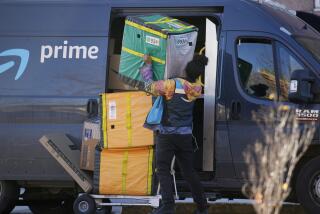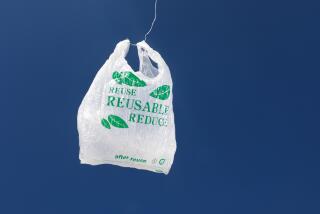Paper or plastic? Pay up
Anyone seeking advice on how to reduce the environmental scourge of plastic carryout bags should avoid consulting the state of California, which has managed to do all the wrong things so far.
The best approach would be a statewide levy on plastic and paper bags. Such fees have been remarkably successful where they’ve been adopted. Use of plastic bags fell by more than 90% at IKEA stores when the company imposed a 5-cent fee.
California started its campaign against the bags with a wimpy mandate that supermarkets had to provide recycling bins for them. That didn’t work. Only 5% of the 120,000 tons of carryout plastic bags with handles that Californians use each year is recycled. Many of those bags end up along the coastline; they are the second-most-common trash item found on the beach. (The ones without handles, such as those used to bag produce or to wrap newspapers, are usually disposed of properly.) They are major contributors to the Great Pacific Garbage Patch, a mass of floating plastic that is bigger than Texas.
At the same time the Legislature imposed the ineffective recycling program, it was pushed by the plastic bag industry into prohibiting cities and counties from imposing fees on the bags. As a result, there is now a patchwork of local bans, which causes headaches for supermarket chains that have to follow different rules in different places; the bans also unnecessarily reduce consumer choice. In 2008, the plastic bag industry sued to stop a ban that had been imposed in Manhattan Beach, saying it required a full environmental impact report. Last week, the California Supreme Court ruled in the city’s favor. It was illogical to think that bans in smaller cities would have a negative effect on the environment, the court decided, leaving open the question of whether large municipalities such as Los Angeles would have to do the studies. Many cities that held off on imposing bans until the case was decided are now expected to move ahead.
Last year, a proposed statewide ban on plastic bags died in the Legislature. There is no current bill to regulate carryout bags one way or the other. But there should be one, and it should mandate fees on both plastic and paper bags rather than banning one or both. Such fees would work for grocery stores, which complain that if just plastic bags were affected, the stores would suffer the added costs of more-expensive paper bags. There would be one rule statewide, avoiding a city-by-city patchwork. Fees wouldn’t actually cost consumers more; they already pay for the bags because the cost is hidden in the price of the products they buy.
A fee on both types of bags would effectively prod customers toward reusable totes while giving them a choice of single-use bags for the times they need or want them. The state Supreme Court’s decision has given California a good reason to do it right this time.
More to Read
A cure for the common opinion
Get thought-provoking perspectives with our weekly newsletter.
You may occasionally receive promotional content from the Los Angeles Times.






